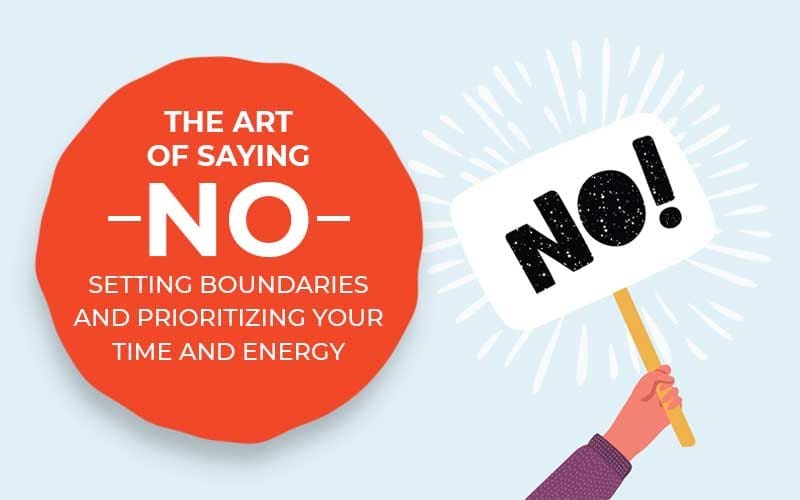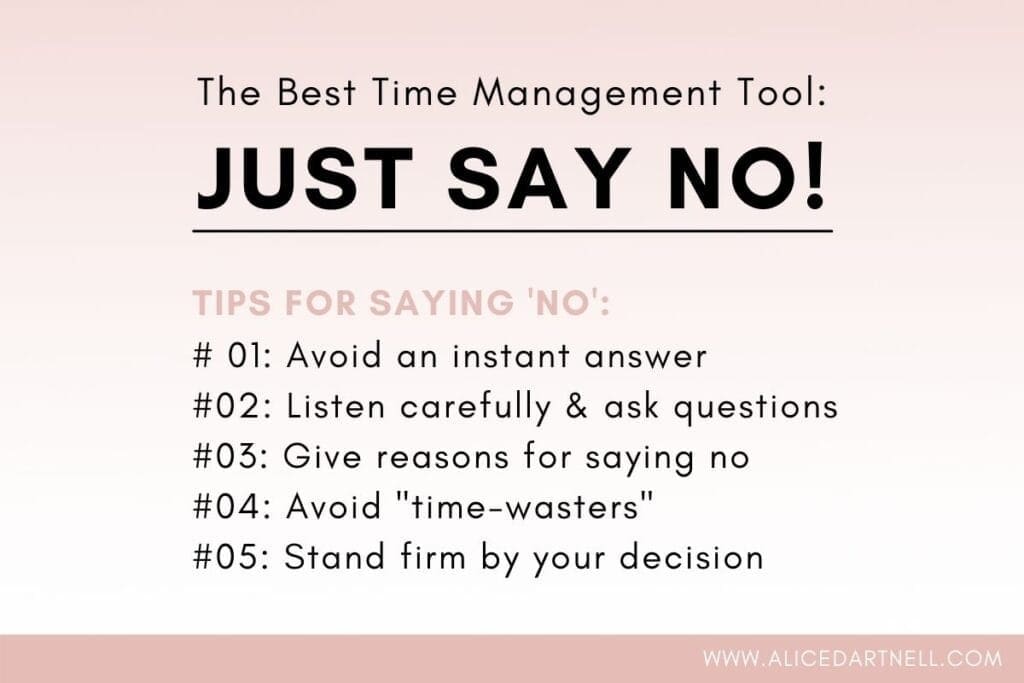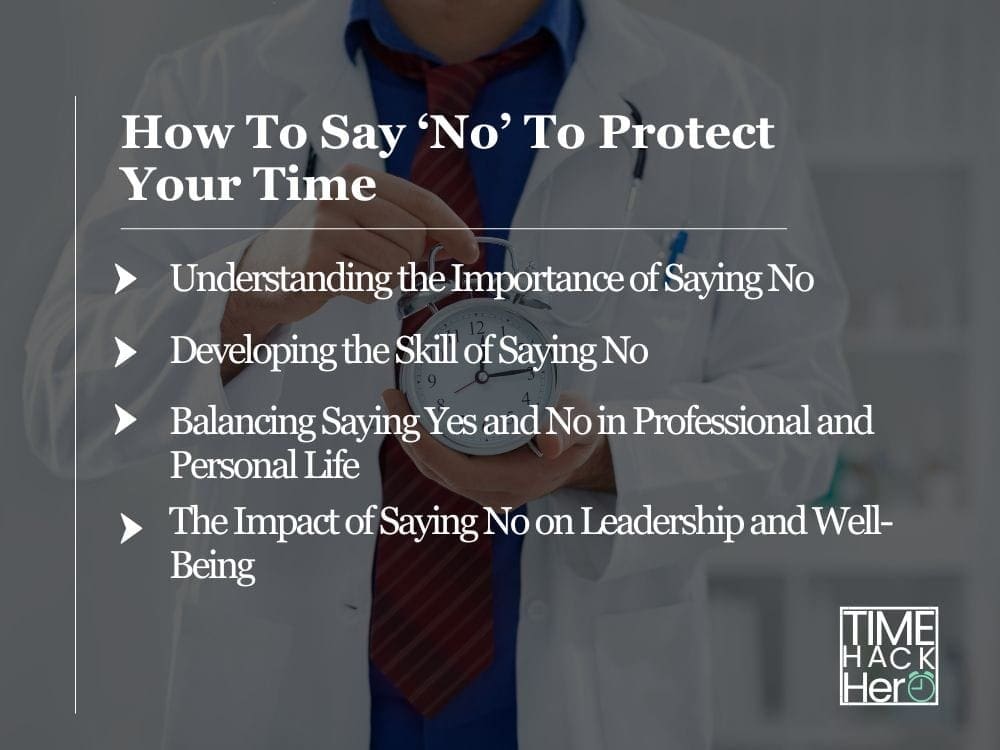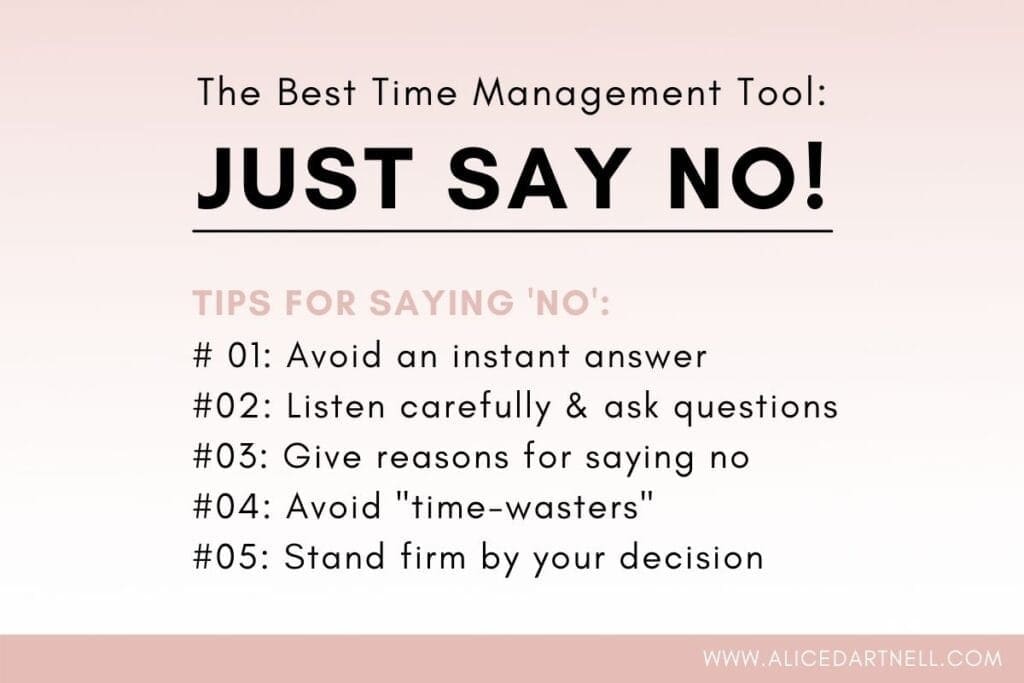In today's fast-paced world, it's easy to feel overwhelmed by the never-ending demands on our time. With a seemingly endless to-do list and constant requests for our attention, it can be challenging to find the time and energy for the things that truly matter. That's why we've put together a comprehensive guide on saying no – a skill that can help us prioritize our time and focus on what's truly important. In this article, we'll explore practical strategies and tips for gracefully declining projects and commitments, empowering us to regain control of our time and live more intentionally. Whether you're a busy professional, a student, or simply someone trying to find more balance in their life, this guide is for you. So let's dive in and discover the power of saying no!
Why Saying No is Important
The consequences of overcommitting
In today's fast-paced world, we often find ourselves juggling multiple tasks and responsibilities. While it may be tempting to say yes to every opportunity that comes our way, overcommitting can have serious consequences. When we take on more than we can handle, our quality of work may suffer, leading to decreased productivity and increased stress. Additionally, overcommitting can leave us feeling overwhelmed and burnt out, negatively impacting our physical and mental well-being.
The importance of setting boundaries
Setting boundaries is a crucial aspect of prioritizing our time effectively. By clearly defining what we can and cannot take on, we establish limits that help us manage our workload in a healthy and sustainable way. Boundaries allow us to protect our time, energy, and resources, ensuring that we can focus on the tasks that align with our priorities and values. When we set boundaries, we create space for the things that truly matter to us, promoting a sense of balance and fulfillment in both our personal and professional lives.
Identifying Your Priorities
Reflecting on your values and goals
Before we can effectively prioritize our time, it is essential to understand our values and goals. Reflecting on what is truly important to us allows us to align our actions with our aspirations. We can ask ourselves questions such as: What do we value most in life? What are our long-term goals? By gaining clarity on our values and goals, we can make informed decisions about where to invest our time and energy.
Evaluating the potential impact of each task or project
Not all tasks and projects hold the same weight in terms of their impact on our lives. By evaluating the potential impact of each task, we can determine which ones deserve our immediate attention. Consider factors such as the potential for personal growth, the alignment with your values and goals, and the long-term benefits of completing the task or project. This evaluation process helps us discern whether a task is worth our time and whether it will contribute meaningfully to our overall objectives.
Narrowing down your top priorities
Once we have reflected on our values and goals and evaluated the potential impact of tasks and projects, it's time to narrow down our top priorities. By identifying and focusing on a few key areas, we can direct our resources more effectively and achieve meaningful results. This approach allows us to give our best to the tasks that truly matter, rather than spreading ourselves too thin. Remember, saying no to less important tasks means saying yes to the things that truly align with our priorities.

This image is property of thecriticalscript.com.
Setting Clear Boundaries
Understanding your capacity and limitations
One of the essential aspects of setting clear boundaries is understanding our own capacity and limitations. It's important to recognize that we are not superheroes and that our time and energy are finite resources. By acknowledging our limitations, we can set realistic expectations for ourselves and others, preventing burnout and overwhelm. Understanding our capacity also means recognizing when we have reached our limits and need to take a step back to recharge and rejuvenate.
Communicating your boundaries effectively
Once we have established our boundaries, it is crucial to communicate them effectively to those around us. Clearly expressing our limitations and commitments helps others understand why we may need to decline certain requests or projects. It's important to remember that effective communication involves being assertive while maintaining respect for others' needs and perspectives. By setting clear boundaries and communicating them openly, we can foster understanding and build healthier relationships with our colleagues, friends, and family.
Learning to say no assertively
Saying no can be challenging, especially when we fear disappointing others or missing out on opportunities. However, learning to say no assertively is a key skill in prioritizing our time effectively. Instead of feeling guilty or defensive, we can say no in a polite yet firm manner, explaining our reasons and offering alternatives when possible. Remember, saying no is not a sign of weakness or selfishness; it is a way of honoring our priorities and protecting our well-being.
Effective Time Management Strategies
Identifying time-wasters and eliminating them
We often unknowingly waste precious time on activities that do not contribute to our goals or well-being. Identifying time-wasters and eliminating them is a crucial step in effective time management. Take a close look at your daily activities and identify any tasks or habits that consistently consume excessive time without providing significant benefits. Whether it's endless scrolling on social media or getting caught up in unproductive meetings, finding ways to minimize or eliminate time-wasting activities allows us to reclaim valuable time and redirect it towards more meaningful pursuits.
Prioritizing tasks based on urgency and importance
Not all tasks are created equal, and prioritizing them based on urgency and importance is essential for effective time management. By categorizing tasks into quadrants based on their urgency and importance, such as the Eisenhower Matrix, we can identify tasks that require immediate attention, those that can be delegated or eliminated, and those that can be scheduled for later. This approach helps us allocate our time and energy efficiently, ensuring that we address the most critical tasks while maintaining a sense of control over our workload.
Using tools and techniques to optimize your time
In today's digital age, there are countless tools and techniques available to help us optimize our time. From project management software to time-tracking apps, these tools can assist in planning, organizing, and maximizing productivity. Experiment with different techniques, such as time blocking or the Pomodoro Technique, to find what works best for you. The key is to leverage these tools and techniques to streamline your workflow, minimize distractions, and make the most of your available time.

This image is property of alicedartnell.com.
Estimating the Impact of Saying No
Considering the long-term benefits of saying no
Saying no to certain requests or obligations may feel uncomfortable in the moment, but it can have significant long-term benefits. When we say no to tasks or projects that do not align with our priorities, we free up time and energy for activities that contribute to our personal and professional growth. By focusing on what truly matters to us, we can make more significant strides towards our goals, enhance our skills, and cultivate deeper relationships. Saying no allows us to prioritize our own needs and aspirations, leading to a more fulfilling and purposeful life.
Evaluating the potential consequences of saying yes
While saying yes to every request may seem like the path of least resistance, it can have unforeseen consequences. When we say yes without considering our capacity or the impact on our priorities, we risk spreading ourselves too thin and sacrificing quality in our work. Overcommitting can lead to stress, burnout, and strain on our relationships. Taking the time to evaluate the potential consequences of saying yes helps us make informed decisions that align with our overall well-being.
Gaining control over your time and energy
By saying no and setting boundaries, we gain control over our time and energy. When we consciously choose where to invest our resources, we avoid being swept up in the chaos of constant obligations and demands. Gaining control over our time allows us to allocate it in ways that align with our priorities and enable us to lead purposeful lives. It empowers us to actively shape our days, rather than merely reacting to external circumstances. With increased control over our time and energy, we can focus on what truly matters and approach our tasks with more intention and enthusiasm.
Handling Requests and Obligations
Assessing the value and alignment of each request
When faced with requests or obligations, it's important to assess their value and alignment with our priorities. Before committing to a task or project, ask yourself whether it truly contributes to your overall objectives and if it aligns with your values. Assess the impact that fulfilling the request may have on your time, energy, and well-being. Taking the time to evaluate each request helps us make informed decisions and avoid taking on tasks that do not serve us or bring us closer to our goals.
Delegating tasks when possible
Not every task or responsibility needs to be shouldered by us alone. Delegating tasks when possible is a valuable strategy for effective time management. Assess whether there are individuals or team members who can take on certain tasks without compromising quality. Delegating not only helps distribute the workload but also empowers others and nurtures a collaborative environment. By recognizing that we don't have to do it all ourselves, we can free up valuable time and energy for tasks that require our unique expertise and focus.
Negotiating alternatives and compromises
Sometimes, saying no outright may not be possible or desirable. In such situations, it's beneficial to explore alternatives and compromises. Can the request be scaled down or extended in terms of the timeline? Is there a possibility for shared responsibilities or collaboration with others? By engaging in open and honest communication, we can find solutions that meet both our needs and the expectations of others. Negotiating alternatives and compromises allows us to find a balance that respects our boundaries while still maintaining healthy relationships and fulfilling our commitments.
Navigating Guilt and Social Pressures
Understanding the sources of guilt and pressure
Saying no can often trigger feelings of guilt and social pressures. It's essential to understand the sources of these emotions and the underlying beliefs that drive them. Guilt may stem from a fear of disappointing others, a desire to be helpful, or a need for external validation. Social pressures can arise from societal expectations, a fear of missing out, or a concern for how others perceive us. By recognizing and understanding these sources, we can begin to challenge and reframe them, allowing us to make decisions based on our priorities rather than external influences.
Cultivating self-compassion and self-care
Navigating guilt and social pressures requires cultivating self-compassion and practicing self-care. It's crucial to acknowledge that it is okay to prioritize our own well-being and say no when necessary. Practice self-compassion by reminding yourself that you cannot be everything to everyone and that it is essential to preserve your energy for tasks and relationships that truly matter. Engage in self-care activities that help you recharge and maintain a healthy mindset. By prioritizing your own needs, you are better equipped to show up fully for others when it matters the most.
Communicating your priorities without feeling guilty
Effectively communicating your priorities without feeling guilty is a skill that can be developed with practice. Start by clearly articulating your boundaries and priorities to yourself; this allows you to have a firm understanding of your own needs. When communicating with others, be open and honest about what you can and cannot take on. Express your reasons for declining certain tasks or requests and offer alternatives or compromises when feasible. Remember that you are not obligated to justify your priorities or apologize for setting boundaries. Assertively communicating your priorities helps establish mutual understanding and respect.
Developing Healthy Boundaries
Recognizing signs of burnout and overwhelm
Developing healthy boundaries begins with recognizing the signs of burnout and overwhelm. Burnout can manifest as physical and emotional exhaustion, cynicism, reduced productivity, and detachment. Overwhelm, on the other hand, may involve feelings of being swamped, a constant sense of urgency, and difficulty focusing. By paying attention to these signs, we can identify when our boundaries have been breached and take the necessary steps to protect our well-being.
Practicing self-reflection and self-care
Self-reflection and self-care are fundamental in developing and maintaining healthy boundaries. Regularly take time to check in with yourself and evaluate how you are feeling physically, mentally, and emotionally. Ask yourself whether your boundaries are being respected or if adjustments need to be made. Prioritize self-care activities that recharge and rejuvenate you. It could be engaging in hobbies, spending quality time with loved ones, or practicing mindfulness or meditation. By making self-reflection and self-care a regular practice, you promote a healthier and more balanced approach to your time and energy.
Creating a sustainable work-life balance
A crucial aspect of developing healthy boundaries is creating a sustainable work-life balance. Understand that work is not your entire life, and other areas such as family, relationships, and personal growth also require attention. Set clear boundaries between work and personal time, both in terms of physical spaces and designated hours. Communicate these boundaries to your colleagues and loved ones, encouraging them to respect them. Remember that a sustainable work-life balance is a lifelong journey that requires regular evaluation and adjustment. Prioritize your well-being and strive for harmony between all aspects of your life.

This image is property of timehackhero.com.
Building a Supportive Network
Surrounding yourself with like-minded individuals
Building a supportive network of like-minded individuals is invaluable when it comes to prioritizing your time effectively. Surrounding yourself with people who share similar values and goals helps reinforce the importance of boundaries and saying no when necessary. Seek out colleagues, friends, or mentors who understand the challenges of maintaining balance and who can offer support and guidance. Having a supportive network eliminates feelings of isolation and allows for shared experiences and learning.
Seeking advice and guidance from mentors
Mentors play a vital role in our personal and professional development. They offer insights, guidance, and wisdom based on their own experiences. Seek out mentors who have navigated the challenges of prioritizing their time effectively and maintaining healthy boundaries. Their guidance can provide valuable perspectives and practical strategies to help you navigate similar situations. Regularly engage with mentors, seeking their input and advice as you continue to refine your time management and boundary-setting skills.
Collaborating and sharing responsibilities with others
Collaboration and shared responsibilities can significantly lighten our workload and help us maintain healthy boundaries. Foster a collaborative environment where tasks can be shared and delegated within teams or groups. Not only does this distribute the workload more equitably, but it also allows for diverse perspectives and skill sets to contribute to the outcomes. By leveraging the strengths of others and sharing responsibilities, you create a supportive and efficient ecosystem where everyone benefits.
Reevaluating and Adjusting Priorities
Regularly reviewing and adjusting your priorities
Priorities can change over time as circumstances evolve or new opportunities arise. It is essential to regularly review and adjust your priorities accordingly. Set aside dedicated time to assess whether your current priorities still align with your values and long-term goals. Identify areas that may need more or less attention and make adjustments as needed. By being open to reevaluating and adjusting your priorities, you ensure that your time and energy are continually focused on what matters most to you.
Being open to new opportunities and challenges
While establishing clear boundaries is crucial, it is also important to be open to new opportunities and challenges that align with your evolving priorities. Embrace the growth and learning that comes from exploring new avenues, even if it means adjusting your existing commitments. Being open to new opportunities allows for personal and professional development, and it keeps your journey dynamic and exciting. Continuously evaluate potential opportunities against your current priorities, making intentional choices that propel you towards your aspirations.
Learning from past experiences
Past experiences provide valuable lessons that can inform future decisions. Reflect on past instances where you overcommitted, neglected boundaries, or failed to prioritize effectively. What were the consequences of those actions? What did you learn from them? Learn from your past experiences, both positive and negative, and apply those lessons to your current and future endeavors. This ongoing learning helps you refine your understanding of your own limits and priorities and refine your approach to time management and boundary-setting strategies.
In conclusion, saying no is essential for prioritizing your time effectively. It allows you to establish boundaries, protect your well-being, and focus on tasks and projects that align with your values and goals. By identifying your priorities, setting clear boundaries, practicing effective time management strategies, and cultivating a supportive network, you can navigate the challenges of saying no assertively. Remember to regularly reevaluate and adjust your priorities, learn from past experiences, and practice self-reflection and self-care. With these tools and strategies at your disposal, you can build a fulfilling and sustainable work-life balance that honors your priorities and empowers you to make the most of your time and energy.





